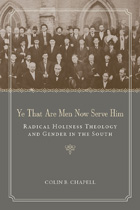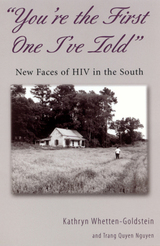3 start with Y start with Y

Modernity remade much of the world in the late nineteenth and early twentieth centuries and was nowhere more transformational than in the American South. In the wake of the Civil War, the region not only formed new legal, financial, and social structures, but citizens of the South also faced disorienting uncertainty about personal identity and even gender itself. Ye That Are Men Now Serve Him traces the changes in southern gender roles during the New South period of 1877–1915 and demonstrates that religion is the key to perceiving how constructions of gender changed.
The Civil War cleaved southerners from the culture they had developed organically during antebellum decades, raising questions that went to the very heart of selfhood: What does it mean to be a man? How does a good woman behave? Unmoored from traditional anchors of gender, family, and race, southerners sought guidance from familiar sources: scripture and their churches. In Ye That Are Men Now Serve Him, Colin Chapell traces how concepts of gender evolved within the majority Baptist and Methodist denominations as compared to the more fluid and innovative Holiness movement.
Grounded in expansive research into the archives of the Southern Baptist Convention; Methodist Episcopal Church, South; and the Holiness movement, Chapell’s writing is also enlivened by a rich trove of primary sources: diaries, sermons, personal correspondence, published works, and unpublished memoirs. Chapell artfully contrasts the majority Baptist and Methodist view of gender with the relatively radical approaches of the emerging Holiness movement, thereby bringing into focus how subtle differences in belief gave rise to significantly different ideas of gender roles.
Scholars have explored class, race, and politics as factors that contributed to contemporary southern identity, and Chapell restores theology to its intuitive place at the center of southern identity. Probing and illuminating, Ye That Are Men Now Serve Him offers much of interest to scholars and readers of the South, southern history, and religion.

The Yogaśāstra and its voluminous auto-commentary, the Svopajnavrtti, is the most comprehensive treatise on Śvetāmbara Jainism. Written in the twelfth century by the polymath Hemacandra, it was instrumental in the survival and growth of Jainism in India as well as in the spreading of Sanskrit culture within Jaina circles. Its influence extended far beyond confessional and geographical borders and it came to serve as a handbook for the Jain community in Gujarat and overseas.
It is a systematic presentation of a set of ideas and practices originally belonging to the Śvetāmbara canonical scriptures and traditions molded into a coherent whole with the help of a long row of scholastic thinkers. Hemacandra integrates innovations of his own as well as non-Jain elements of pan-Indian and Saiva provenance, attesting to a strong Tantric influence on medieval Jainism. Some of these elements came to be perpetually included within Śvetāmbara orthopraxy and orthodoxy due to the normative status acquired by the Yogaśāstra.
The present translation is the first of its kind in a Western language.

In the second wave of the HIV epidemic, those with the disease are more likely to be female, young, heterosexual, a racial minority, and rural-living than in the past. An understanding of the vastly different lives of this second wave of HIV-infected persons is vital to the development of user-friendly health care systems.
"You're the First One I've Told" offers a view into the lives of men and women infected with HIV. The experiences of twenty-five people living with this disease in rural eastern North Carolina serve as the foundation of this book, which also draws upon unique HIV/AIDS survey data collected by the authors and statistics from the Southeastern United States. This combination of qualitative and quantitative information provides readers with a vivid description of how people live with HIV/AIDS in the midst of their often traumatic lives, and why they manage their illness in ways that seem to contradict mainstream medical and social wisdom. The people interviewed represent a variety of races, genders, professions, family lives, and medical and social service access and utilization.
READERS
Browse our collection.
PUBLISHERS
See BiblioVault's publisher services.
STUDENT SERVICES
Files for college accessibility offices.
UChicago Accessibility Resources
home | accessibility | search | about | contact us
BiblioVault ® 2001 - 2024
The University of Chicago Press









